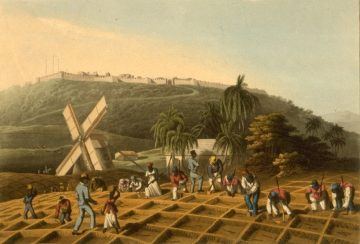Mary Caton Lingold in Public Books:
 I vividly remember the rush I felt after my first encounter with the story of the Haitian Revolution. It was a sudden and miraculous sense that everything was not as it seemed, that it had never been, and that I had much to learn. A massive uprising of enslaved people became a 12-year fight for independence that ultimately created the first sovereign Black republic in 1804. Haiti was the second nation to cast off colonial rule in the Western hemisphere, and its revolution led to the abolition of slavery across the French empire and laid out a roadmap for independence that would inspire other colonies in Latin America.
I vividly remember the rush I felt after my first encounter with the story of the Haitian Revolution. It was a sudden and miraculous sense that everything was not as it seemed, that it had never been, and that I had much to learn. A massive uprising of enslaved people became a 12-year fight for independence that ultimately created the first sovereign Black republic in 1804. Haiti was the second nation to cast off colonial rule in the Western hemisphere, and its revolution led to the abolition of slavery across the French empire and laid out a roadmap for independence that would inspire other colonies in Latin America.
Two recently published books examine intellectual histories of the revolutionary Caribbean, illuminating the what and how of Haiti’s rise. In The Common Wind: Afro-American Currents in the Age of the Haitian Revolution, Julius S. Scott explains how revolutionaries worked from below decks and beneath the gaze of overseers to circulate ideas across vast space, imperial borders, and linguistic barriers. Baron de Vastey and the Origins of Black Atlantic Humanism by Marlene L. Daut heralds a prominent and prolific early Haitian writer, Jean-Louis Baron de Vastey, whose avant-garde, anti-colonial writings eviscerate the philosophical imperialism of the Anglo-North. Daut’s study tracks Vastey’s significant influence on postcolonialism, critical race theory, and the Negritude movement, not to mention abolition and the revolutionary project of Haitian sovereignty itself. Both of these books follow the spread of radical politics, but Scott emphasizes vernacular transmission in the form of rumor, song, and marketplace exchanges, whereas Daut attunes to literary and print cultural transmission.
More here.
